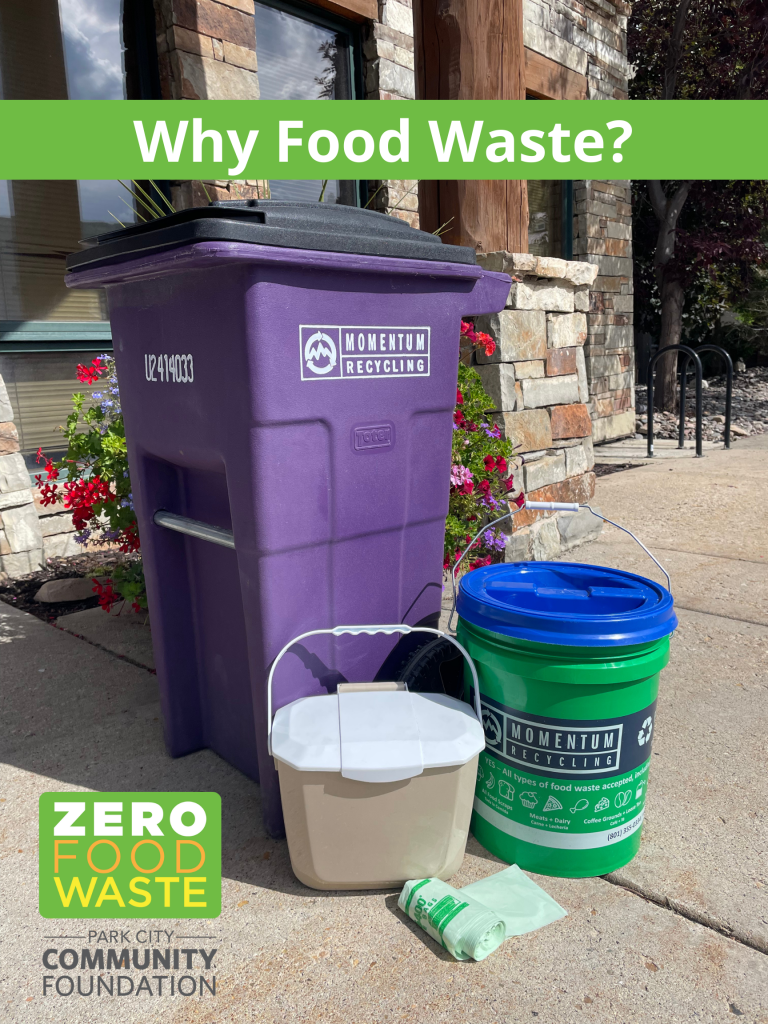
 When Park City Community Foundation’s Climate Fund decided to take a more strategic approach and narrow its focus, the group tapped experts and started researching the most impactful, achievable, and replicable climate solutions in the area. Food waste quickly rose to the top.
When Park City Community Foundation’s Climate Fund decided to take a more strategic approach and narrow its focus, the group tapped experts and started researching the most impactful, achievable, and replicable climate solutions in the area. Food waste quickly rose to the top.
The environmental and economic impacts of food waste
Broadly speaking, food waste in landfills is a significant contributor to methane emissions, a greenhouse gas far more potent than carbon dioxide. Additionally, producing and transporting food consumes vast amounts of energy and resources, only for one-third of the world’s food supply to be wasted. This is why Project Drawdown lists Reduced Food Waste as one of its top climate solutions to address emissions impact.
Locally, Utahns generate twice as much waste as the national average. Food waste takes up nearly 50% of the air space at the Summit County landfill. That’s especially notable when the local landfill has filled its only lined cell and is now dumping waste into an older, unlined cell.
This all has economic impacts on our community. While the dollar amount for climate change related events is hard to calculate, the landfill has a clear cost. Constructing a new lined cell next year will cost taxpayers around $3.5 million. If we divert all food waste from the landfill, we could save $1.47 million annually. The new lined cell, which would otherwise fill in 15-17 years, could last over 30 years. Diverting all compostable materials could extend the cell’s lifespan to 50 years, keeping valuable nutrients in the cycle instead of burying them in an expensive hole in the ground. The economic impact is equally concerning.
Zero Food Waste is achievable and replicable
Zero Food Waste relies on simple actions that have massive impact. It’s simple and something we can do now. Many climate solutions require significant infrastructure, funding, and policy changes at the state and federal level. This is something our community has full autonomy over. And it’s something the Community Foundation is well-positioned to lead through our collaborative nature and access to funding that we can use to jumpstart a brand-new program.
“Park City Community Foundation has some superpowers that we tap into,” the Community Foundation’s Climate Fund Manager Andy Hecht said. “We have the ability to convene resources and that’s people power. We can get the right people in the right room talking and really analyzing the solutions we’re working on. So, we get the best minds together to figure out the best solutions possible.”
Recent reports and headlines paint a grim picture when it comes to the climate crisis, and it’s easy to feel daunted and paralyzed by the doom and gloom. Park City Community Foundation is taking a different approach, inspired largely by Molly Kawahata, an advocate and strategist for climate change policy, and a former Climate Advisor for the Obama administration. She takes a psychological approach to climate change activism by inspiring and spreading hope about what we can do to make our future healthier.
Through it all, our intent is to create a model and program that other, similar communities can take and replicate in their own areas. That is why we are tracking our progress through the Impact Dashboard and will be openly sharing our successes and losses along the way.
We are all in!
To reach Zero Food Waste by 2030, we need everyone involved in this community-led effort. It starts with residents in the greater Park City area and will expand to residents across all of Summit County and businesses. All the while — between now and 2030 (and beyond) — we will be partnering with nonprofits and pushing for change on the city- and county-level. Summit County and Park City have already signed the Zero Food Waste Compact and we will be advocating for strategies to extend the life of our overflowing landfill. Eventually, we hope that Zero Food Waste efforts are so widespread that even visitors to our area will also participate.
“There are significant benefits we can accomplish with easy changes,” Andy said. “We don’t have to do it all. Not one person can do it all.”
We are in this together! Please join the movement if you haven’t already.